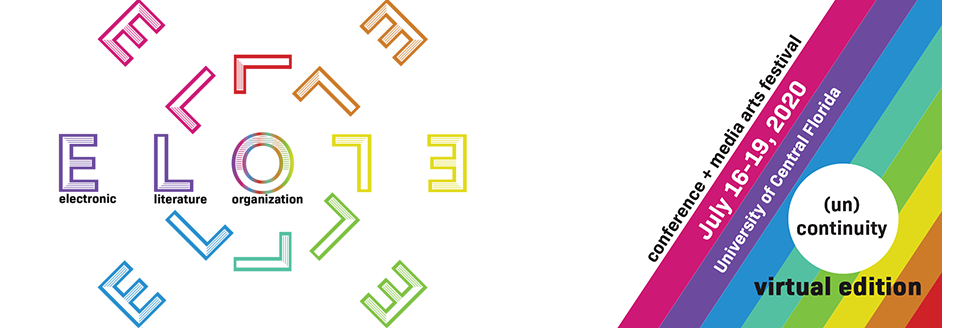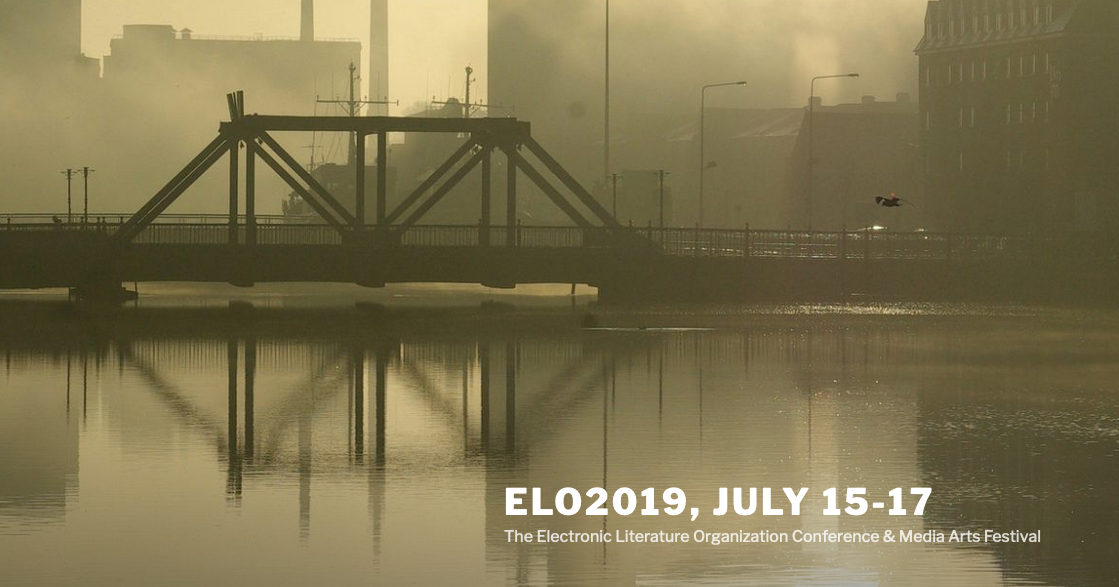Conference
-
ELO 2020 Conference: Live Events
As we prepare to launch this year’s online conference, we would like to invite our community to support the ELO with their 2020 membership dues ($50 regular membership, $25 for… Read more.
-
Announcement: ELO 2020: Moving Forward, Virtually
The ELOrlando leadership team has found ourselves, like many conferences, faced with rethinking our plans. We were thrilled to be hosting you here in Orlando this July, but in light… Read more.
·
-
Announcing the 2019 ELO Prizes
At the annual conference of the Electronic Literature Organization (ELO), held this year in Cork, Ireland, outgoing President Dene Grigar announced the 2019 ELO Prize winners, including: The Robert Coover… Read more.
·
-
ELO Conference Survey
The ELO Board of Directors– and our conference organizers– are interested in offering the most rewarding conference experiences to its community. In order to continue improving in this mission, your… Read more.
-
ELO Cork begins
The 2019 ELO conference has begun! The conference, hosted at University College Cork, runs July 15-17. This is the first international conference of digital literature held in Ireland and marks… Read more.
·
-
CFP: ELO 2019 Conference & Media Arts Festival (7/14-16/19; 12/21/18)
ELO 2019 Conference and Media Arts Festival Peripheries Cork, Ireland July 14-16, 2019 (Due: Dec 21, 2018) Proposals are now being accepted for presentations and exhibition pieces at the annual Electronic Literature… Read more.
·
-
Event Highlights Indigenious Storytelling and New Media
http://bit.ly/indigenouselit August 14, 2018 UQAM For Immediate Release Montreal, Aug 13, 2018 – Indigenous storytelling and experimental new media will take center stage at this year’s conference of the Electronic… Read more.
-
ELO 2018: Attention à la marche / Mind the Gap
ELO 2018: Attention à la marche / Mind the Gap Literature meets digital culture in Montrealhttps://sites.grenadine.uqam.ca/sites/nt2/en/elo2018 August 13-17, 2018 For Immediae Release Montreal, Aug 3, 2018 – For the first… Read more.
-
MLA 2017 Readings & Performances
Join the Electronic Literature Organization for an evening of readings & performances during the Modern Language Association conference in Philadelphia, PA. The event takes place in the Connelly Auditorium (room… Read more.
·
-
CFP ELO 17 (Dec 5; July 19-22, 2017)
ELO’17 Electronic Literature > Affiliations, Communities, Translations Hosted by UFP – University Fernando Pessoa, Porto, Portugal, July 19 – 22, 2017 http://conference.eliterature.org Call For Papers & Works The ELO (Electronic… Read more.
·


